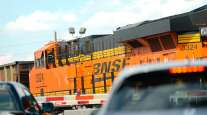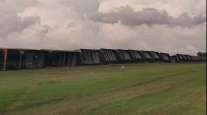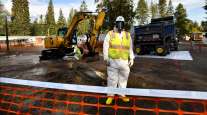BNSF Charging Less to Lug Oil in Cars That Meet Latest Federal Specs

If you want to carry crude oil in an older railroad car, it’s going to cost you.
Burlington Northern Santa Fe, the largest U.S. crude-by-rail carrier, is offering lower rates to lug oil in cars that meet the latest federal specifications issued in May. That means the vast majority of cars riding the rails today, known as DOT-111 and CPC-1232, will cost more to haul.
The new rates are part of a plan by the railroad owned by Berkshire Hathaway Inc. to push older cars off the tracks as regulators scrutinize the industry over a series of high-profile explosions. To that end, BNSF published higher rates for older cars relative to more advanced models, such as the DOT-117, company spokesman Michael Trevino said by phone on June 16.
“Economics for the customer will be more favorable for DOT-117 cars and retrofitted CPC-1232” than the rest, he said.
BNSF issued a letter to customers last month saying the company wanted all DOT-111 tank cars off its railways within a year and all CPC-1232 cars that aren’t retrofitted to comply with new regulations off its system in three years, Trevino said.
The new rates create a three-tiered pricing structure, with 111s facing the highest rates, followed by CPC-1232s that haven’t been retrofitted, according to transportation consultants including John Schmitter, founder of KEP, and Jamie Heller, president of Hellerworx Inc. The new pricing may spur litigation from shippers who argue that they shouldn’t face surcharges if their cars are still compliant.
“I assume this will be litigated,” Heller said June 16 at a conference organized by the U.S. Energy Information Administration. “These are federally compliant cars. They’re licensed. From a shipper’s perspective, when they bought these other cars, they were compliant, and they still are. As long as the shipper’s compliant, why should there be a surcharge?”
BNSF in January began applying a $1,000-a-car surcharge to haul DOT-111s filled with crude. That added about $1.50 a barrel to the cost of transporting oil on them. A trade group for 400 U.S. refining and petrochemical makers sued BNSF over the charges in March.
BNSF at its peak transported 830,000 barrels of crude a day over its rails, as oil companies produced more crude from shale formations in North Dakota, Colorado and Texas than existing pipelines could handle.
Railed volumes have shrunk in recent months as new pipelines have come online and an oil price crash put a halt to production growth. BNSF Chairman Matt Rose yesterday said he expected a 38% rebound in prices since mid-March should boost the amount of crude his company carries.




